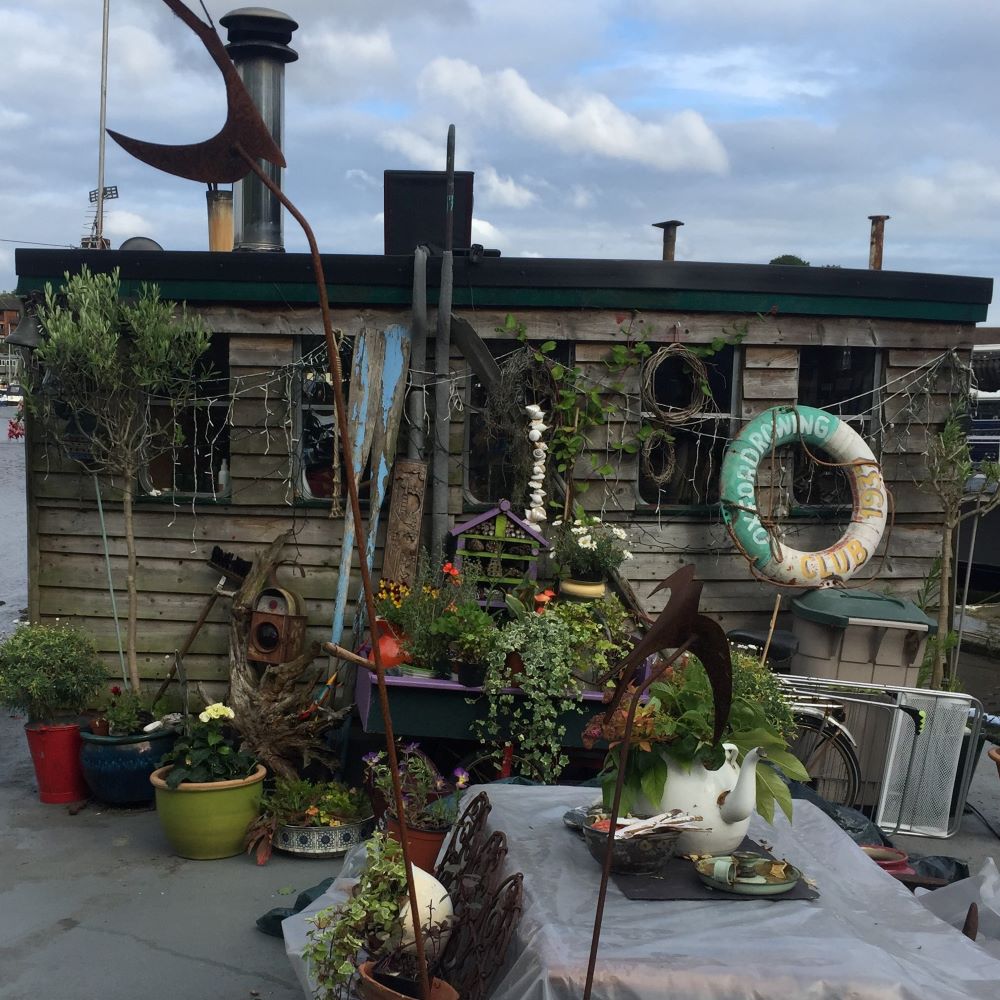What prompts us to choose the homes we inhabit? Is it purely a financial decision, is it the space we need or is it deeper? Maybe it’s family pressures or maybe it’s a dream…
Megan had always dreamt of living on a houseboat, so at age 21, when her dad talked about buying a large family house for them all, it seemed the perfect time to make a move for her own space. But in a funny twist of fate, she simply moved into a flat and that prompted her dad to buy a houseboat!
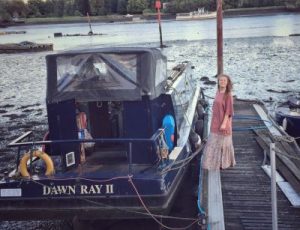
He was looking for the change that she wanted for herself; seeking to create a new way of life, a new story. And Megan felt both excited for him but also a tiny bit jealous. She saw how his world had changed overnight – home became a place of community, reconnection with self and nature, the seasons and the times of tide and weather; he had his own very special place, freedom and a precarious floating home balanced on rotting wood – it embodied creative chaos!
Now, two years on, Megan does at last have her own houseboat – a peaceful and special personal space disconnected from the surrounding city. “Dawn Ray II” sits bobbing gently on the water, or when the tide is out, slouched elegantly on the mudflats, surrounded by the elements – water, light, air, and the smell of the river, mud and wildlife. She was hooked and after a year or two she is only reluctantly renting her beautiful two room narrowboat to her friend Ben; sadly, work has taken her away from Southampton.
So what is it about living on the water that so draws some people? We spoke to Ben and Megan and three other people who live only a few minutes from the city centre, undisturbed and hidden from the busy streets and noise of Southampton.
Houseboat life has its ups downs, quite literally on a tidal river. But what is the reality?
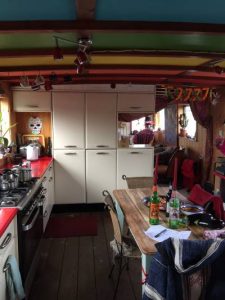
Latest estimates reckon around 15,000 people now live on houseboats around the UK – the vast majority in canal boats or marinas. Some in big cities – London, Manchester, Bristol and of course, Southampton. We’re a bit different here – there are marinas and riverside houseboats on the tidal stretches of the Itchen and Hamble, but it’s not a common thing along the south coast, so I was intrigued to get a unique insight into this way of life that isn’t for the faint-hearted.
“You never know what’s going to happen,” says Megan with a laugh and a shudder. “It’s risky, you pay a lot more attention to the weather and your surroundings. You’re far more vulnerable, but not being so protected means you look at your life more closely. It’s not easy but it’s worth it.”
“Absolutely,” agrees Ben (pictured below), who is now renting Megan’s boat while she works 80 miles away. “I’ve only been here two months, and I was so glad to get my own place. When it’s stormy you might spend a few hours watching out for stray boats which have dragged their anchor, fending them off with a pole.”Fortunately, that’s only happened once, and he says the wildlife, swans and other water birds, the water flowing past his window, and the privacy more than make up for the occasional problem. “That’s my TV now.”
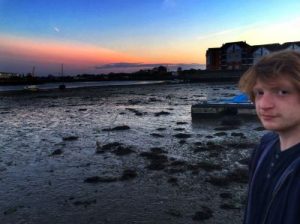
The boat is a singularly well-designed space – wood burner, galley kitchen of course, small double bedroom, tiny complete bathroom and a deck to sit on outside; with solar panels on the roof, gas cannisters and a septic tank, everything is covered. It’s colourful, light and airy, cosy and warm – at least on an early June evening. Come winter, Ben confesses, he may not be so warm or enthusiastic but he’s willing to give it a go. In the meantime there’s talk of a late-night kayaking trip…
At the other end of the scale, and barely half a mile downstream, Deb and Chris live in almost palatial luxury. Well, palatial is something of an exaggeration. But the two decks, down below cabin spaces and beautifully tumbled landside gardens give you that sense of space you rarely get this close to the city centre.
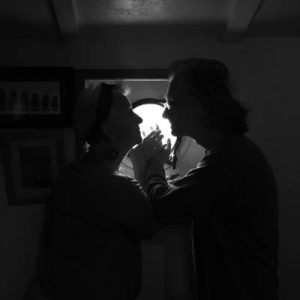
Exactly a year ago, they gave up their semi-detached Victorian bricks and mortar for a 1950s ammunition barge. It’s light and airy in the upstairs sitting room – with colourful sofas and a door onto the foredeck. You go in through the large and seemingly ‘normal’ kitchen. It’s about the same square footage as their old house and they bought it on a whim after they met the owner at a party.
“I wasn’t sure at first,” acknowledges Chris, “obviously, boats can sink, and I really thought I’d miss the garden.” Debs was more enthusiastic, so they visited four times in four days and promptly agreed to buy. What changed Chris’s mind? “I saw a neighbour’s boat/deck garden and realised anything is possible.” That’s Liz’s garden and she’s on a boat nearby, surrounded by the most beautiful flowers and plants in a creative chaos of colour and texture that flows between the boat and the land. “I was convinced,” adds Chris, “and in reality, the mudflats and the riverbanks are now part of our garden too.”
One of the things that so drew Deb was the fact that she’d lived within a few hundred yards of the river for 20 years – but had no access. When she visited her son in his new quayside flat, she realised what she was missing. She wanted to connect to the water and live closer to nature.
So, what’s the difference a year on?
“I spend most of my time outside now,” says Deb. “Not just the summer, but throughout the year – I see the sky and feel the air, watch the swans grow up, the seagulls coming upstream, the river life passing by – canoeists, rowers, people fishing.”
“I’d never been on this river in a boat,” laughs Chris. “I thought it would be a little different, but it’s been a big shift in perspective. When I wake up, I can tell by the light where the tide is, what the weather is, where the wind is. You feel every movement of the water, every change in the river’s flow. It’s peaceful but always changing too.”
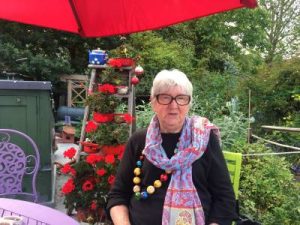
And as I said, nearby their neighbour Liz, has been living on boat after boat in the same spot for 50 years.
“I was working in London – three different jobs at once – and it was so cold; then a friend suggested I get away to work on the liners. I’d always loved the sea, even though it was nothing like where I grew up in Surrey. I moved down here, got a job at sea, loved it, met my husband on board and then we bought our first MTB.” (That’s a decommissioned Motor Torpedo Boat to you and me, and it even attracted war veterans and historians eager to see a piece of history still “in service.”)
They’ve been through a few different vessels in their time – two MTBs, fishing vessels, and lately a 1927s trawler from Hull. They brought up their children here as well, Liz tells me, remembering them doing their homework, with their dog, sitting in a dinghy moored nearby one afternoon. Not surprisingly, the sea is in the blood and her daughter now has a whole fleet of tall ships in Australia.
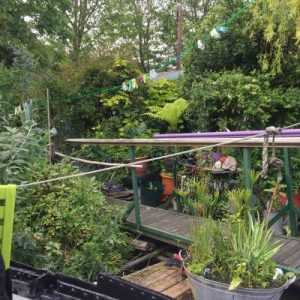
The best part of her houseboat life is the amazing peace and quiet. As we sit on deck under her bright red garden umbrella, we’re surrounded by the sound of the wind, the trees and the water – nothing else. The city could be a hundred miles away. As she says, “it’s a quieter life, it attracts a different sort of people; guests who stay always say they sleep better – the sea does that to people.”
On the downside, it’s true, the weather is always a challenge, and she recalls the hurricane of October 1987. “The tide came in early, one of the boats broke its mooring and crashed onto the shore. Trees came down. It was a terrible night – we thought the world was ending.” But then the next day, things begin to get back to normal. It’s part of life and there’s always upkeep on a boat. You can’t let things slip.”
And that’s the main difference I detect after talking to these semi-urban sea people, hidden away water creatures and boat lovers. There’s this embracing of impermanence and acceptance of change and decay, the work needed to fight against the elements, but the feeling of reward and accomplishment is equally strong.
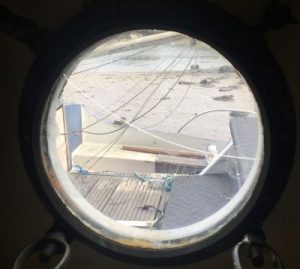 All agree that it’s a more physically demanding way of life. Whether it’s chopping wood for the stove in winter, cleaning and painting, sealing planks, lugging gas canisters on board, fixing the toilets – again and again – or just the longer walk with the shopping. And coupled to that, it’s an insecure life. One boat sank last year, and there’s no insurance or easy replacement for your house when it’s three feet deep in water and mud. Not everyone would cope with that. “On the other hand, there’s an amazing cultural heritage,” says Chris. “Our boat is history and we’re maintaining her. We live in something that is unique and in a unique place within a city I’ve lived in all my adult life.”
All agree that it’s a more physically demanding way of life. Whether it’s chopping wood for the stove in winter, cleaning and painting, sealing planks, lugging gas canisters on board, fixing the toilets – again and again – or just the longer walk with the shopping. And coupled to that, it’s an insecure life. One boat sank last year, and there’s no insurance or easy replacement for your house when it’s three feet deep in water and mud. Not everyone would cope with that. “On the other hand, there’s an amazing cultural heritage,” says Chris. “Our boat is history and we’re maintaining her. We live in something that is unique and in a unique place within a city I’ve lived in all my adult life.”
“It’s OK at the moment,” says Ben, “but with no hot water and pumping the septic tank every few months, we’ll see how winter goes!”
“‘There’s a rat in the kitchen’ isn’t just a song anymore,” giggles Deb. “But to be honest, I love it. Our family can’t believe we didn’t do this years ago. It’s perfectly suited to who we are.”
“It forces you to be self-reliant, practical and solve your own problems,” adds Megan. “Living on the water’s edge, being exposed to forces more powerful than you, makes you re-evaluate yourself and process your emotions differently. I totally miss it, and I’m sure I’ll come back to this or something similar one day.”

